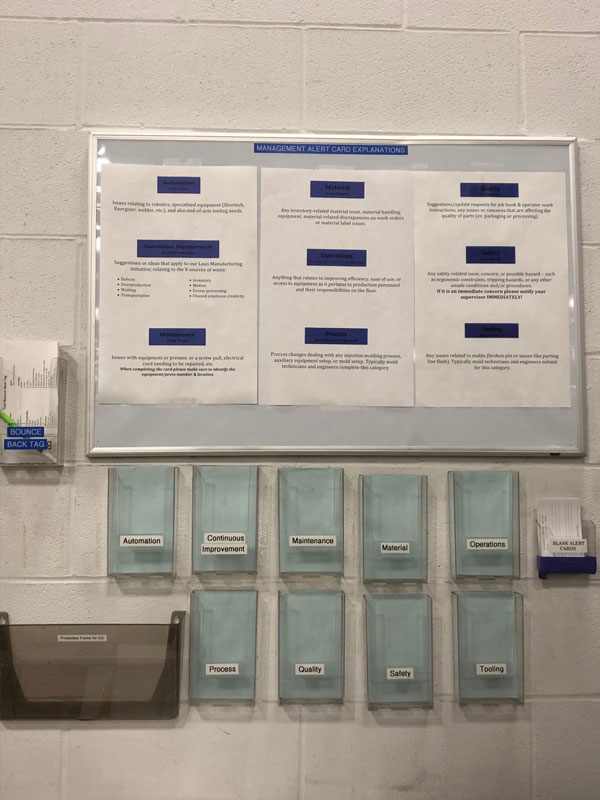by Lara Copeland, contributing editor
Plastics Business
As the old saying goes, “What gets measured, gets done,” and Thogus, Avon Lake, Ohio, takes this idea to heart. Founded in 1950, Thogus began as a tool and die company. Now, a custom plastic injection molder and contract manufacturer, Thogus develops solutions for multiple industries, including small appliance, healthcare, consumer, shooting and sport, fluid management, transportation, industrial, and building and construction. Its 76,000-square-foot facility houses 35 injection molding machines that range in size from 44 to 400 ton. Employing around 100 staff members, the Thogus management team knows that good communication is key to its success.
Over six years ago, Thogus took a casual approach to communication regarding improvement. “It was very informal and occurred sporadically on the production floor,” noted Erin Hlavin, human capital manager at Thogus. “There was no system in place to track ideas or projects implemented. We knew we were making improvements – we just didn’t have a formal record of them.” That’s when the management alert card (MAC) system was put into place.
“The MAC system is one of the tools that is used to encourage communication between shifts, between employees and management, and between departments,” Hlavin explained. This improvement in the communication system allows for documentation of concerns, issues and suggestions to help improve Thogus.
Set up in a universally accessible location on the wall outside the operations office, a box full of blank MACs is available for employees to fill out. There also are nine labeled boxes where personnel can submit MACs. Each box represents one of nine areas – automation, continuous improvement, maintenance, material, operations, process/engineering, quality, safety and tooling – and one manager is assigned to each area.
With so many areas available for improvement suggestions, Hlavin said at least two or three management alert cards are submitted per week. “Each manager is responsible for reviewing and determining the proper next steps for each card that is submitted,” she said.
If suggestions received through the MAC system are not feasible for any reason, the responsible manager follows up with the person who submitted the card to explain why the suggestion will not be used. For MACs that are implementable, results or progress are formally reviewed each month.
Since the MAC system has been implemented, Hlavin said many completed projects have helped save time and money on production floor processes. “Employees have found easier ways to perform tasks, which has led to reducing labor on jobs,” she stated. “Some suggestions have led to improvements in the safety of the workplace environment.”
As an example of an implemented MAC card, a trainer reported an issue with a pin fixture used on a medical part. The fixture was worn out and, as a result, parts were not being stopped where they should. A MAC card was used, and a request for a new fixture was issued. “Within four days, the tooling team had a new fixture created and implemented,” Hlavin said. After the new fixture was in place, the inserts could be placed on the fixture within the correct length, preventing shorts from being produced.
In another instance, two inspection operators identified a problem with being able to safely retrieve packaging from the top racks in the inventory storage areas. Packaging was stacked across the width of a pallet, but the operators only could access the front half of the pallet – leaving the rest of the pallet unevenly stacked. The operators suggested the purchase of a pole or tool of some sort to reach the packaging bundles at the back of the pallet. Thogus ordered poles with hangers on the end, much like those used in retail stores, to allow operators to safely reach the far sides of the pallets. Overall, Hlavin said, “Implementing the program has led to awareness on all levels of the plant.”
Creating a safer, more efficient working environment isn’t the only benefit of the MAC system. Additionally, employees are acknowledged on the Management Alert Card Board when they have suggested an improvement that has a positive impact on the plant.
“It is important to reassure employees that all suggestions are evaluated and taken into consideration,” Hlavin explained. “We also have a ‘Shout-Out’ board in our lunchroom where peers and managers often recognize those that have made improvement suggestions on the MAC.” Those Shout-Outs are read at Thogus’ monthly communication meetings, and the person being thanked gets to spin a prize wheel.
Many facilities are interested in increasing improvement communication, and according to Hlavin, “ensuring you have a team committed to implementing improvements and a program supported by management” are keys to its success. “We also would recommend tracking suggestions/improvements so that you have the information to refer back to – its always good to see your progress.”





